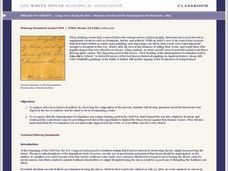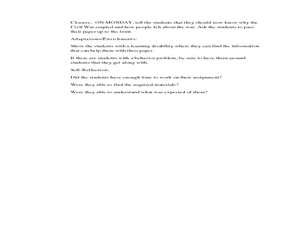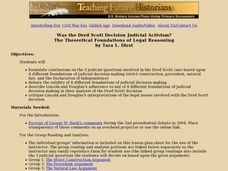Curated OER
The Gettysburg Address
Students explore the implications of the Gettysburg Address. In this Civil War lesson, students read a handout regarding Gettysburg Address, analyze an excerpt of the speech, and complete the provided worksheet activities.
Curated OER
Civil War Time Line
Students develop time lines of various events that took place during the Civil War. They sequence events in chronological order and demonstrate research skills using the Internet and library sources.
Curated OER
History Close to Home
Students examine primary sources as related to Nevada and the Civil War. In this United States history activity, students gather and analyze various primary sources in small groups and interpret unknown vocabulary words by using context...
Curated OER
Debates Over Suspension of the Writ of Habeas Corpus
Eighth graders study the concept of Habeas Corpus. In this Civil War lesson, 8th graders research the reasons for and against suspending the writ of habeas corpus. Students analyze various documents.
Curated OER
Gettysburg: The Civil War's Costliest Battle
Students research the Civil War and the Battle of Gettysburg. In this Gettysburg lesson, students analyze journals and letters written by the Gettysburg soldiers. Students define Civil War soldier vocabulary words. Students compare and...
Curated OER
Could the Civil War Been Avoided Through Compromise?
High schoolers determine whether the American Civil War could have been avoided. In this Civil War instructional activity, students examine primary and secondary sources to prepare to participate in a classroom debate that requires them...
Curated OER
Secession Crisis: In Two Virginia Communities
Students are divided into groups and are assigned newspaper articles from the year 1861. The articles are from either Republican or Democratic parties discussing the Virginia secession. They complete worksheets and have a whole class...
Curated OER
Using Art to Study the Past: Abraham Lincoln and the Emancipation Proclamation - 1863
Fifth graders analyze artwork as historical artifact and recognize that the Emancipation Proclamation was a major turning point in the Civil War.
Curated OER
Experiencing the Civil War
Eleventh graders examine the Civil War. In this American History instructional activity, 11th graders investigate the causes, effects, and the lives of people during the Civil War. Students develop a research paper using...
Library of Congress
The Emancipation Proclamation and the Thirteenth Amendment
How did the Emancipation Proclamation lead to the Thirteenth Amendment? Middle schoolers analyze primary source documents including the text of the Emancipation Proclamation, political cartoons, photographs, and prints to understand...
University of California
The Civil War: Secession of the South
Was the Southern states' decision to secede from the Union protected by the United States Constitution? Eighth graders discuss the constitutionality of the South's justification for secession, particularly the secession of South...
Curated OER
Meet the Press: American Presidents
Students interpret historical evidence presented in primary and secondary resources. In this presidential history lesson, students research the accomplishments of George Washington, Abraham Lincoln, Frankiln D. Roosevelt, and Barack...
Curated OER
Persuasion in Historical Context: The Gettysburg Address
The Gettysburg Address is a powerful text. Use it to teach persuasion and the importance of word choice. The activity detailed here includes a scaffolded background knowledge activity that includes image analysis of photos from the Civil...
University of California
The Civil War: The Road to War
The United States Civil War resulted in the highest mortality rate for Americans since the nation's inception. Delve deeper into the causes for the drastic separation of states with a history lesson plan that features analysis charts,...
American Battlefield Trust
1862: Antietam and Emancipation
Was the Emancipation Proclamation a revolutionary document or just a military strategy? It proclaimed that all those enslaved in Confederate states would be "forever free." Logistically, though, it did little. The order, however,...
Curated OER
1864-1865: Bringing the War to an End
An interesting lesson plan explains the last battles of the war and the terms of the Articles of Surrender. It also analyzes the election of 1864 with copies of the Baltimore and Chicago platforms. To conclude the lesson, academics...
American Battlefield Trust
The Gathering Storm: The Coming of the Civil War
Slavery or states' rights: What really started the American Civil War? A lesson geared towards middle schoolers explores the causes of the Civil War. Scholars view an interactive of the Gathering Storm exhibit online and complete a...
K20 LEARN
Blue or Gray? Perspectives on the Civil War
Using primary and secondary sources, such as letters and diaries from soldiers and civilians, learners consider why people fought in the American Civil War. A role-playing Historical Mingle activity, as well as discussion questions and...
Center for History Education
Did Southern Free Men of Color Fight for the Ideals of the South?
Much of history is distasteful. Primary sources often reveal attitudes acceptable at the time that no longer are. But to understand controversial historical events, historians must examine primary sources that represent a wide variety of...
K20 LEARN
Analyzing Early American Figures: Analyzing History
Who were they? High school freshmen brush up on their research skills by investigating an important person in American history. They select a name, fill out a KWHL chart, and research why their person is important. Scholars then complete...
Utah Education Network (UEN)
7th Grade Poetry: Ode Poem
Walt Whitman's "Captain, My Captain" and Robert Frost's "The Road Not Taken" provide seventh graders with examples of odes. After reading and discussing these and other examples, young poets craft an ode and respond to the ode of a...
Curated OER
Was the Dred Scott Decision Judicial Activism?
Students debate the validity of 4 different foundations of judicial decision-making. They describe Lincoln and Douglas's adherence to any of 4 different foundations of judicial decision-making in their analysis of the Dred Scott decision
Curated OER
All That Sparkles is Silver!
Young scholars analyze photographs for information about life in Virginia City Nevada in the late 1800s. For this Nevada statehood lesson, students work in teams to analyze photographs from Virginia City. Young scholars brainstorm...
Curated OER
The Civil War
Eighth graders engage in a lesson that is concerned with the Civil War and they conduct research using a variety of resources. The research is used to create the context for class discussion and a possible project as an extension to the...
Other popular searches
- Abraham Lincoln
- Abraham Lincoln and Honesty
- Abraham Lincoln Penny
- Abraham Lincoln Log Cabin
- Abraham Lincoln Birthday
- Abraham Lincoln Words
- Abraham Lincoln Biography
- Abraham Lincoln and Slavery
- Celebrate Abraham Lincoln
- Abraham Lincoln Election
- Abraham Lincoln Cabin
- Abraham Lincoln Slavery

























